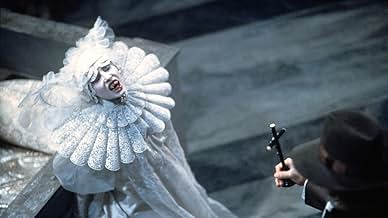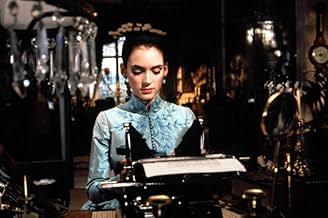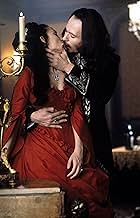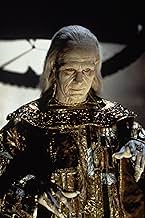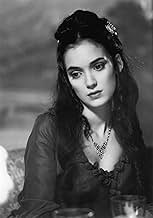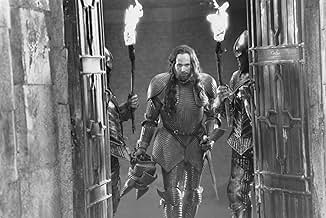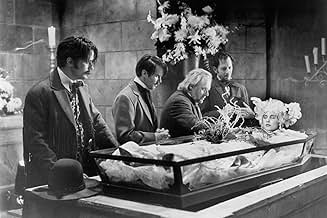El centenario vampiro conde Drácula llega a Inglaterra para seducir a la prometida del abogado Jonathan Harker, Mina Murray, y causar estragos en tierra extranjera.El centenario vampiro conde Drácula llega a Inglaterra para seducir a la prometida del abogado Jonathan Harker, Mina Murray, y causar estragos en tierra extranjera.El centenario vampiro conde Drácula llega a Inglaterra para seducir a la prometida del abogado Jonathan Harker, Mina Murray, y causar estragos en tierra extranjera.
- Dirección
- Guión
- Reparto principal
- Ganó 3 premios Óscar
- 25 premios y 25 nominaciones en total
Billy Campbell
- Quincey P. Morris
- (as Bill Campbell)
Reseñas destacadas
Incessantly gothic & unabashedly erotic, Dracula brings Bram Stoker's literary classic to the film canvas in all its Victorian glory & required faithfulness and is a visual splendour overflowing with bold vision & audacious choices. But the technical mastery on display is also severely hampered by the film's inconsistent tone, overdone theatrics, casting choices & passionless performances.
Directed by Francis Ford Coppola (The Godfather & Apocalypse Now), the story unfolds like an eerie & sensual reverie and is substantially elevated by its operatic set pieces, lavish costumes, vivid photography, old-school effects & uncanny score. The film gets the atmosphere right with its inspired use of colours, shadows, lighting & subliminal imagery that works in tandem with its sexually charged narrative.
However, the impressionistic touches, cinematic flourishes & technical ingenuity still don't prove to be enough to mask its shortcomings, for its bloated length & over-the-top drama are further exacerbated by the casting decisions that nearly destroys the whole picture. Neither Keanu Reeves nor Winona Ryder are right choices for their roles and as for the remaining cast, their inputs are serviceable at best & forgettable at worst.
Overall, Dracula is a visual feast that delivers on mood, setting & filmmaking creativity but the commitment evident in the technical aspects are sorely lacking in the acting department. And that in effect hurts its ability to fully immerse viewers into its dreamlike escapade. Its romantic gestures are sincere even if the tonal shifts are all over the place but for a premise that has so much promise, the film as a whole leaves much to be desired.
Directed by Francis Ford Coppola (The Godfather & Apocalypse Now), the story unfolds like an eerie & sensual reverie and is substantially elevated by its operatic set pieces, lavish costumes, vivid photography, old-school effects & uncanny score. The film gets the atmosphere right with its inspired use of colours, shadows, lighting & subliminal imagery that works in tandem with its sexually charged narrative.
However, the impressionistic touches, cinematic flourishes & technical ingenuity still don't prove to be enough to mask its shortcomings, for its bloated length & over-the-top drama are further exacerbated by the casting decisions that nearly destroys the whole picture. Neither Keanu Reeves nor Winona Ryder are right choices for their roles and as for the remaining cast, their inputs are serviceable at best & forgettable at worst.
Overall, Dracula is a visual feast that delivers on mood, setting & filmmaking creativity but the commitment evident in the technical aspects are sorely lacking in the acting department. And that in effect hurts its ability to fully immerse viewers into its dreamlike escapade. Its romantic gestures are sincere even if the tonal shifts are all over the place but for a premise that has so much promise, the film as a whole leaves much to be desired.
"Apocalypse Now" worked due to its hazy, surreal vision of a hellish world. Coppola returned thirteen years later and created a similarly haunting and poetic so-called "masterpiece," a supposed truthful adaptation of Bram Stoker's Dracula tale - when, in fact, the truth is that this movie is no more faithful to Stoker than the (superior) Universal Pictures original.
The hazy film-making is visually satisfying, and some of the special effects are - simply put - amazing. Coppola's backlighting and use of shadows is creative and unique. But, unfortunately, after a while his emphasis on style over content begins to eat away at the film's other strengths - the relationship between the heroine (Winona Ryder) and Dracula (Gary Oldman) is weak. Many story links are completely nonsensical and people appear and disappear at whimsy. The heroine's fiancée (Keanu Reeves) writes to her from Transylvania, asking her to depart at once to marry him; in a matter of one or two scenes she has suddenly traveled a vast distance and is standing at the alter prepared to wed. It seems like Coppola loses a grip on his characters and plotting very early on.
Oldman gives a chilling performance but isn't given very much to do, because he's set aside and the special effects take over. The opening scenes of his battle and his motivation to become the King of the Undead is very enthralling - if Coppola had maintained this mixture of style and content the movie would have been far better.
The casting of the weak Keanu Reeves and Winona Ryder in leading roles harms the impact of the film as well. Reeves sounds like a Californian pothead imitating a Brit; Ryder treats the material as if it is a dramatic, over-the-top theatre rendition; every line she speaks is sickeningly cheesy.
Anthony Hopkins turns in a disappointing performance as the utterly forgettable Van Helsing, who is given very little to do in this particular film apart from show up when convenient and sprout fancy little one-liners, most of them dramatic closers to scenes (e.g. "We are dealing with a demon!", then a cut-away to another scene.) Overall, "Dracula" is a good film and is worth seeing for its visuals alone. It is not, however, the strongest adaptation of Bram Stoker's novel; given the hype surrounding its release in 1992, the completed effort is rather lackluster in the story department.
The hazy film-making is visually satisfying, and some of the special effects are - simply put - amazing. Coppola's backlighting and use of shadows is creative and unique. But, unfortunately, after a while his emphasis on style over content begins to eat away at the film's other strengths - the relationship between the heroine (Winona Ryder) and Dracula (Gary Oldman) is weak. Many story links are completely nonsensical and people appear and disappear at whimsy. The heroine's fiancée (Keanu Reeves) writes to her from Transylvania, asking her to depart at once to marry him; in a matter of one or two scenes she has suddenly traveled a vast distance and is standing at the alter prepared to wed. It seems like Coppola loses a grip on his characters and plotting very early on.
Oldman gives a chilling performance but isn't given very much to do, because he's set aside and the special effects take over. The opening scenes of his battle and his motivation to become the King of the Undead is very enthralling - if Coppola had maintained this mixture of style and content the movie would have been far better.
The casting of the weak Keanu Reeves and Winona Ryder in leading roles harms the impact of the film as well. Reeves sounds like a Californian pothead imitating a Brit; Ryder treats the material as if it is a dramatic, over-the-top theatre rendition; every line she speaks is sickeningly cheesy.
Anthony Hopkins turns in a disappointing performance as the utterly forgettable Van Helsing, who is given very little to do in this particular film apart from show up when convenient and sprout fancy little one-liners, most of them dramatic closers to scenes (e.g. "We are dealing with a demon!", then a cut-away to another scene.) Overall, "Dracula" is a good film and is worth seeing for its visuals alone. It is not, however, the strongest adaptation of Bram Stoker's novel; given the hype surrounding its release in 1992, the completed effort is rather lackluster in the story department.
Excuse me, but I just read a series of reviews by people who are disappointed by the fact that this movie didn't follow the same old script that has been done over and over and over again. They gave a provocative movie a rating of "1" so they could sabotage what most people thought. Go do something else besides writing about films. This is not a perfect movie, but it takes the basic text of the Stoker novel and extrapolates from it. People seem to be reacting tot he sexuality of this. If we go back to the seminal movies, "Nosferatu" being the greatest example, we see that sexual tension dominates these films as well as the books. Dracula has power over people. He can draw women to him. He is not an animal, but he is a sub-human with desires to dominate. Coppola uses this to show his evil intent. Gary Oldman is the most eccentric and wonderful Dracula to come along in years. When did it become written that every Dracula should be the black-caped Bela Lugosi figure that kids still dress up as on Halloween. He is a force to be reckoned with; he is evil; and he is powerful. Remember, people accept the scenes of him sucking the blood out of women without any trouble. Why not an evil abuser of their being? Remember, they are under a spell over which they have no control.
As is the case with many of these latter-day horror movies, this is visually stunning. This one is particularly so, with beautiful colors, wild special effects, lavish sets and a handful of pretty women, led by Winona Ryder.
It isn't all beauty; there are some horrific, bloody moments in here. I've seen the film three times and the first two times was terrifying to me in parts. The last viewing wasn't as scary, but maybe I was distracted by seeing this on DVD for the first time, which enhanced the visuals and added some nice 5.1surround sound.
At two hours and 10 minutes, it's a bit long but there are very few lulls, if any. Gary Oldham gives his normal intense performance as Dracula and it never hurts to have Anthony Hopkins in the film.
The only negative I found was Keannu Reeves, who sounds a bit wooden in his lines. Is it my imagination, or is he a terrible actor? Maybe it's just his voice. Nonetheless, Cary Elwes, Richard Grant, Sadie Frost and Bill Campbell all give good support to this film which is a real feast for the senses.
It isn't all beauty; there are some horrific, bloody moments in here. I've seen the film three times and the first two times was terrifying to me in parts. The last viewing wasn't as scary, but maybe I was distracted by seeing this on DVD for the first time, which enhanced the visuals and added some nice 5.1surround sound.
At two hours and 10 minutes, it's a bit long but there are very few lulls, if any. Gary Oldham gives his normal intense performance as Dracula and it never hurts to have Anthony Hopkins in the film.
The only negative I found was Keannu Reeves, who sounds a bit wooden in his lines. Is it my imagination, or is he a terrible actor? Maybe it's just his voice. Nonetheless, Cary Elwes, Richard Grant, Sadie Frost and Bill Campbell all give good support to this film which is a real feast for the senses.
Opening with his vow to rise from his grave and take revenge on a God who allowed his beloved to die while he defended Him on the battlefield, we see Count Dracula in the 1890's, conducting business with a London firm. When his first consultant goes mad, Jonathon Harker is sent to Dracula in his place, only to find himself trapped in the castle. Meanwhile, Dracula travels to London where he feeds on the lovely Lucy Westenra. Her various suitors try to help her and call for Professor Van Helsing to come and help they realise that this is not a simple battle against a disease of the blood.
Although a little too long for my liking, this film is a very rich gothic telling of a story that has become watered down slightly with the many different versions of stories with the characters. Here the basic plot follows the tale from the creation of Dracula, his love and his confrontation with Van Helsing and the various suitors of the lovely Lucy. The story is told with a real respect for the source, perhaps a little too much as it can be a little to heavy and lacking in spark at times. However, for the most part the gothic telling works very well and feels very lavish and rich.
Visually the film is great rich colours in the scenery and costumes really bring the goth out of the film. Meanwhile Coppola works well with shadows and images in the backgrounds to make the film have the feel of an old silent movie version (eyes in the storm) but with modern standards. It's not really scary, but I didn't need it to be, I was more interested in the overall story, and that worked well.
The cast suffer from a bit too much respect for the material, some of their performances are a little too hammy and heavy. Oldman is good when compared to the better known image of the `Bela Lagosi' Dracula, but I did still find him a little too hammy at times. Likewise Rider is not totally convincing. Hopkins is quite fun to watch and the three suitors (including Ewles and Grant) very much play stiff upper lipped straight men! Of course of their performances tower with majesty above the sheer miscast ineptitude of Reeves. From the start his accent is horrid, but his inability to bring out emotions and character basically kills his character off before the film has even got going.
Despite this the film is actually very enjoyable even if it is a bit too respectful and long occasionally making it feel a little heavy going. The rich presentation and loyalty to the source material makes for a very enjoyable story even if it isn't really what we'd see now as a horror.
Although a little too long for my liking, this film is a very rich gothic telling of a story that has become watered down slightly with the many different versions of stories with the characters. Here the basic plot follows the tale from the creation of Dracula, his love and his confrontation with Van Helsing and the various suitors of the lovely Lucy. The story is told with a real respect for the source, perhaps a little too much as it can be a little to heavy and lacking in spark at times. However, for the most part the gothic telling works very well and feels very lavish and rich.
Visually the film is great rich colours in the scenery and costumes really bring the goth out of the film. Meanwhile Coppola works well with shadows and images in the backgrounds to make the film have the feel of an old silent movie version (eyes in the storm) but with modern standards. It's not really scary, but I didn't need it to be, I was more interested in the overall story, and that worked well.
The cast suffer from a bit too much respect for the material, some of their performances are a little too hammy and heavy. Oldman is good when compared to the better known image of the `Bela Lagosi' Dracula, but I did still find him a little too hammy at times. Likewise Rider is not totally convincing. Hopkins is quite fun to watch and the three suitors (including Ewles and Grant) very much play stiff upper lipped straight men! Of course of their performances tower with majesty above the sheer miscast ineptitude of Reeves. From the start his accent is horrid, but his inability to bring out emotions and character basically kills his character off before the film has even got going.
Despite this the film is actually very enjoyable even if it is a bit too respectful and long occasionally making it feel a little heavy going. The rich presentation and loyalty to the source material makes for a very enjoyable story even if it isn't really what we'd see now as a horror.
¿Sabías que...?
- CuriosidadesPrince Vlad's scream after he drives his sword into the cross is not the voice of Gary Oldman. Lux Interior, lead singer of punk band The Cramps, recorded the scream, and it was dubbed in.
- PifiasElisabeta's eyebrows and eyelids twitch visibly when Prince Vlad stumbles down to view her dead body.
- Versiones alternativasBritish video version contains a scene where Jonathan Harker's nipple is licked by one of the female vampires, who then bites it and causes it to bleed. When the film premiered in America this scene was not included.
- ConexionesEdited into Bram Stoker's Dracula: Deleted and Extended Scenes (2007)
- Banda sonoraLove Song for a Vampire
(from 'Bram Stoker's Dracula')
Produced by Stephen Lipson
Written and Performed by Annie Lennox
Courtesy of BMG Ariola Muenchen GmbH
Selecciones populares
Inicia sesión para calificar y añadir a tu lista para recibir recomendaciones personalizadas
Detalles
- Fecha de lanzamiento
- Países de origen
- Idiomas
- Títulos en diferentes países
- Dràcula de Bram Stoker
- Localizaciones del rodaje
- Empresas productoras
- Ver más compañías en los créditos en IMDbPro
Taquilla
- Presupuesto
- 40.000.000 US$ (estimación)
- Recaudación en Estados Unidos y Canadá
- 82.522.790 US$
- Fin de semana de estreno en EE. UU. y Canadá
- 30.521.679 US$
- 15 nov 1992
- Recaudación en todo el mundo
- 215.862.692 US$
- Duración2 horas 8 minutos
- Color
- Mezcla de sonido
- Relación de aspecto
- 1.85 : 1
Contribuir a esta página
Sugerir un cambio o añadir el contenido que falta





